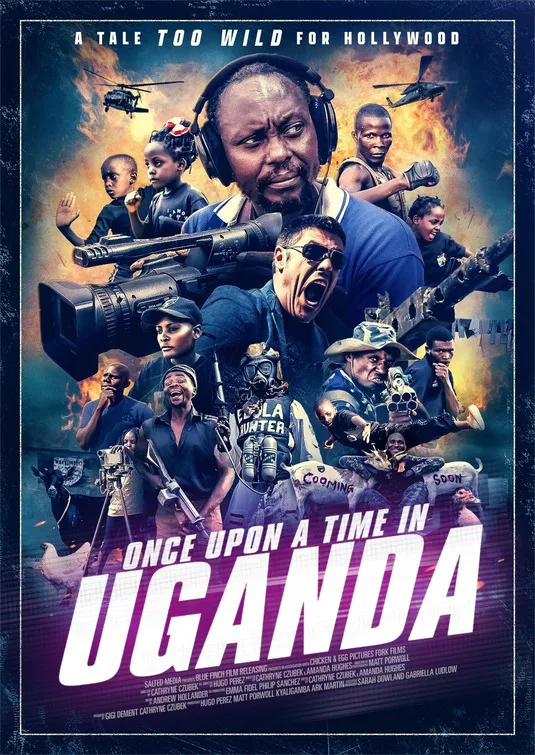The 2010 Ugandan film “Who Killed Captain Alex?” is unlike any action movie that came before it. Over a non-stop entertaining 70 minutes, the violent but knowingly cartoonish single-camera film unleashes an onslaught of explosions, gunfire, and exploding heads, treating war as extreme, gleeful slapstick. A voice shares space on a soundtrack that sometimes borrows a flute-synth cover of Seal’s “Kiss From a Rose,” his exclamatory commentary emphasizing how serious you should not take its Rambo-inspired carnage: “Everybody in Uganda knows kung fu! The movie’s on!” “Who Killed Captain Alex?” is pure cinema. Like whatever young Sammy Fabelman of “The Fabelmans” would go on to make, it’s the work of a dreamer with a movie camera.
Cathryne Czubek’s charming and entertaining documentary “Once Upon a Time in Uganda” bottles the magic that goes into such a production, which includes years of hard work, the support of believers, and a need to make one’s imagination reality. “Who Killed Captain Alex?” is one of many high-octane and low-budget action features from writer/director Nabwana I.G.G., known here as Isaac, the founder of Ramon Productions in the Wakaliga slum in Uganda. He also calls his enterprise Wakaliwood, and there among people’s homes and mud roads, you can find him and his crew of stunt people, props makers, stars, and filmmakers using condoms for blood bursts or tying a green screen to the side of a one-story building so that someone can imitate hanging from a helicopter. His monthly-made features are then distributed around town, though DVD players are not common. It is not a high-profit business model, but that isn’t why Isaac is doing this.
The creation of Isaac’s homemade blockbusters is (sometimes uneasily) framed as a life-changing journey for his most dedicated follower, a white New York film impresario named Alan Hofmanis, who becomes our surrogate into this world where Czubek and her crew have an invisible presence. Hofmans saw a type of cinematic revolution when he got his first glimpse of Wakaliwood (the viral trailer for “Who Killed Captain Alex?”), and he spent years living in Uganda trying to help Isaac with his knowledge of film festivals and publicity. They began a friendship and partnership that had Alan working on, sometimes starring in (as the one white person always beaten up) and helping produce and distribute Isaac’s movies.
Isaac’s prolific cinema is the kind of DIY goodness that Michel Gondry (“Be Kind Rewind”) has long been manifesting, and Czubek has a playfulness similar to the French filmmaker while illustrating the history of Wakaliwood, including how it presents the past. I loved a moment where Isaac reflected on how while he was a brick-maker, he was always been thinking about movie-making—behind him, characters appear as if walking out from his dream. He then “directs” them away, one of a few moments in which Isaac, Alan, and Czubek treat this documentary as means for more Wakaliwood rule-breaking.
Taking place over many years, “Once Upon a Time in Uganda” focuses on both Alan’s and Isaac’s experiences, although the former can sometimes have less impact, even with all of his advocacy. Czubek’s take struggles with the main problem in its tale, a critical moment when the friendship breaks down after Isaac agrees to make a TV series out of “Who Killed Captain Alex?” with a Ugandan media mogul. Alan sees it as a type of betrayal. Though they live near each other, they don’t talk for weeks. Part of it seems to be a miscommunication, which is hard to make a good drama out of, and also out of Alan’s steadfastness to keep Wakaliwood within his definition of pure. Money can ruin good ideas, as Hollywood knows, which makes Wakaliwood even more of a potent microcosm for Czubek’s ode to movie-making. But this problem does make for a good scene in which the two friends and collaborators eventually talk and can’t meet eye-to-eye, a more bracing and stark moment compared to the usual fictional chaos in Isaac’s films.
It’s also rewarding and helpful when this doc addresses some of the “criticisms” that Isaac’s cinema could face, especially for those who see “Who Killed Captain Alex?” out of the loving context this movie provides. “Once Upon a Time in Uganda” voices Isaac’s perspective—“They are action in a comedy way”—while Alan compares them to Road Runner cartoons, scoffing at anyone thinking Isaac should be doing something more dramatic to be taken seriously. In a reflective, tactfully incorporated moment, Isaac talks about the real horrors he saw in Uganda in the ‘80s after the fall of Idi Amin and then directs a kid to play his younger self running away from violence. But he also tells us he doesn’t want to make movies about such real horror, at least yet. “This is a different narrative about Africa,” he says.
As it champions the importance of Wakaliwood with equal admiration and clarity, “Once Upon a Time in Uganda” maintains a personal POV that offers more than an outsider’s awe, even though Alan’s wanderlust arc just doesn’t compare to what Isaac has done and is doing. But while certain passages of the doc can be less emotionally involving than others, its surf-guitar-fueled montages of Isaac making another audacious movie are always invigorating. “Once Upon a Time in Uganda” is the advocacy that Isaac’s auteurship and ideology need most—this doc helps one re-appreciate movie-making as a compulsive, creative odyssey, a shot-by-shot pursuit of elusive inner peace.
Now playing in theaters.




















